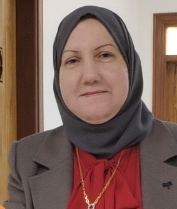
Dina Ahmed Omer
Research InterestsEconomic development
| Gender | FEMALE |
|---|---|
| Place of Work | Technical college of Management/ Mosul |
| Position | تدريسية |
| Qualification | Ph.d |
| Speciality | Economic development |
| dinaao@ntu.edu.iq | |
| Phone | 07710013700 |
| Address | موصل, mosul, Mosul, Iraq |
Skills
القيادة (100%)
مهارات التواصل (100%)
المثابرة (100%)
ادارة الوقت (100%)
مهارة التنظيم (100%)
القدرة على التكيف (100%)
حل المشاكل (100%)
أخلاقيات العمل (100%)
الذكاء العاطفي (100%)
التعاون المشترك (100%)
Academic Qualification
دكتوراه/أستاذ
Mar 6, 2015 - Feb 13, 2022حصلت على شهادة الدكتورة في التنمية الاقتصادية بدرجة أستاذ
بكالوريوس اقتصاد
Mar 9, 1991 - Mar 6, 1996حصلت على شهادة البكالوريوس عام 1996
ماجستير أقتصاد
Apr 9, 2012 - May 6, 2015حصلت على شهادة الماجستير عام 2015
Working Experience
القلم السري [م.القلم السري]
Jan 6, 2008 - Presentم.العميد للشؤون الادارية والمالية [م.العميد للشؤون الادارية والمالية]
Dec 7, 2018 - Presentم.العميد للشؤون الادارية والمالية
م.الموقع البديل في أربيل [م.الموقع البديل في أربيل]
Jan 6, 2015 - Presentم.الموقع البديل في أربيل
م.وحدة البعثات والعلاقات الثقافية [م.وحدة البعثات والعلاقات الثقافية]
Feb 2, 2023 - Presentم.وحدة البعثات والعلاقات الثقافية
م.البريد الالكتروني في المعهد التقني/نينوى [م.البريد الالكتروني في المعهد التقني/نينوى]
Jun 1, 2006 - Aug 9, 2008م.البريد الالكتروني في المعهد التقني/نينوى
م.العميد للشؤون الادارية والمالية في المعهد التقني/نبنوى [م.العميد للشؤون الادارية والمالية]
Jun 6, 2008 - Jan 9, 2011م.العميد للشؤون الادارية والمالية في المعهد التقني/نبنوى للفترة من 2008 ولغاية 2011
Publications
ECONOMIC CHANGES IN DEVELOPING COUNTRIES AFTER THE CORONA CRISIS
Jan 7, 2024Journal RIMAK 246 International Journal of Humanities and Social Sciences
publisher RIMAK 246 International Journal of Humanities and Social Sciences
DOI 2717-8293
Issue 6
Volume 4
Abstract: The COVID-19 pandemic has placed developing countries facing a host of new and increasing economic risks, some of which may only be discovered over time. Ideally, governments should develop new policies to deal with all areas where the pandemic has exposed or exacerbated economic vulnerabilities, namely: financial sector stability, the legal framework for insolvency for the household and corporate sectors, access to credit, And the continued ability of governments to bear debt. However, only a few governments have the resources and political room to maneuver to address all of these risks simultaneously. They will need to identify the risks that pose direct threats to an equitable recovery in their own context, and prioritize policy responses accordingly . Key Words: Scenarios, Political Variables, Economic Variables, Corona Crisis.
WOMEN'S EMPOWERMENT AND ECONOMIC DEVELOPMENT IN SELECTED COUNTRIES FOR THE PERIOD (2000-2020)
Jan 4, 2024Journal IJHER 394 International Journal of Humanities and Educational Research
publisher IJHER 394 International Journal of Humanities and Educational Research
DOI 2757-5403
Issue 6
Volume 2
Women's empowerment and economic development are closely linked in one direction. Only development can play a major role in reducing inequality between men and women. In the other direction, empowering women may benefit development. The relationship between empowerment and development is reciprocal and a continued commitment to equality per se may be needed to achieve equality between men and women . This study examines the economic empowerment of women in selected Arab countries (Iraq, Qatar, the Kingdom of Saudi Arabia, Jordan, the Arab Republic of Egypt and Algeria) during the period (2000-2020) using the ordinary least squares method. In this study, we reviewed the concept and factors that affect women’s empowerment. Which in turn affects all other variables in these countries, the most important of which are the political and social aspects. For the purpose of knowing the factors affecting the economic empowerment of women, the study adopted the quantitative method to estimate these factors, which are (the ratio of women’s enrollment in secondary education to males, the average life expectancy at birth for males). females, fertility rate, per capita GDP) . The results of the study found that the most important factors influencing the economic empowerment of women in most Arab countries are health, the ratio of women’s enrollment in secondary education to males, average life expectancy at birth for males and females, and the per capita GDP, whose effect was significant and positive, while it was found that the fertility rate It appeared morally and negatively. Key Words: Economic Empowerment of Women, Selected Arab Countries
THE IMPACT OF ICT ON CORRUPTION IN SELECTED DEVELOPING COUNTRIES
Jan 3, 2024Journal RIMAK 225 International Journal of Humanities and Social Sciences
publisher RIMAK 225 International Journal of Humanities and Social Sciences
DOI 2717-8293
Issue 6
Volume 2
Abstract With governments in developing countries under increasing pressure to deal with corruption, information and communications technology (ICT) has become an important strategic tool and resource. Although the use of ICT in developing countries is not new, using it to deal with corruption poses a challenge. This study reports on the impact of the successful use of ICT in dealing with corruption in a group of developing countries. The results reveal that there are many successful e-government efforts in dealing with corruption, which represent the most important challenge in developing countries in light of the absence and lack of clarity in government work procedures, and the key to dealing with corruption is the presence of clear and complete work procedures. The common basic principles that lead to the success of e-government and methods that have the potential to provide governments in developing countries with a strategy, method and techniques were discussed. Some of their work procedures need to be analyzed before implementing e-government to deal with corruption. Key words: Corruption, Information Technology, Developing Countries
THE RELATIONSHIP BETWEEN TOURISM AND GENDER EQUALITY - AN ANALYTICAL STUDY OF SELECTED COUNTRIES
Jan 12, 2023Journal IJHER 106 International Journal of Humanities and Educational Research
DOI 2757-5403
Issue 5
Volume 6
Abstract The research aims to study the relationship between tourism and gender equality for a selected group of Asian countries (Thailand and the Maldives), developed countries (Japan and Israel), developing countries (China and India) and some oil-rich countries (Qatar, Saudi Arabia, the Arabian Peninsula), and the Philippines, with its high index of gender equality. gender, and Yemen and Jordan, which ranks last in the world) and using the PVAR model for the period (2006-2019), where the results of the causal test showed that there is a causal relationship between tourism and gender equality, and we found that there is a long-term balance relationship between tourism and gender equality. In the short term, this relationship did not appear. The other three variables, including economic growth, employment and education, were also analyzed to influence tourism and had a positive impact. Key words: Tourism, Gender Equality














